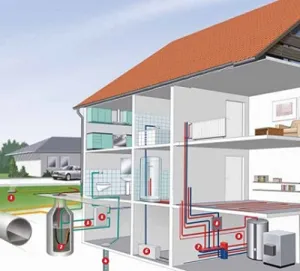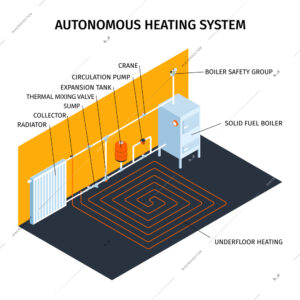
As the chill of winter approaches, the quest for efficient heating solutions gains prominence. In this guide, we will delve into the nuanced steps and considerations for implementing autonomous heating in a block of flats using a gas boiler. Elevate your living space’s comfort while optimizing energy usage with a strategic approach to autonomous heating.
1. Feasibility Assessment for Autonomous Heating:
Commence your journey to autonomous heating by conducting a thorough feasibility assessment.
Collaborate with building management to understand the structural and regulatory considerations.
Ensure that the infrastructure supports the integration of a gas boiler system, setting the foundation for a successful and compliant project.
1.1. Collaboration with Building Management:
Engage in open communication with building management to assess the feasibility of autonomous heating.
Discuss structural considerations and evaluate the existing heating infrastructure to determine compatibility with a gas boiler system.
1.2. Regulatory Compliance:
Understand the local regulations and building codes related to gas boiler installations.
Obtain necessary permits and approvals from relevant authorities before initiating the project.
2. Strategic Selection of a Gas Boiler:
Choosing the right gas boiler is pivotal for long-term efficiency αντλίες θερμότητας. Evaluate the size and heating requirements of the apartment building to select a boiler that aligns with these needs.
Prioritize energy-efficient models to not only reduce operational costs but also contribute to a sustainable and eco-friendly heating solution.
2.1. Heating Requirements Assessment:
Conduct a comprehensive assessment of the heating requirements for the entire apartment building. Consider factors such as the number of units, square footage, and insulation levels.
2.2. Energy-Efficient Models:
Explore gas boilers with high energy efficiency ratings. Consider models with programmable features for enhanced control and energy optimization.
3. Professional System Design for Optimal Efficiency:
Engage the expertise of heating engineers to design a system that maximizes efficiency. Consider factors such as the placement of radiators or underfloor heating, pipe sizing, and the integration of advanced control systems.
A well-designed heating system ensures uniform warmth distribution and minimizes energy wastage.
3.1. Heating System Design Consultation:
Collaborate with heating engineers to design a customized system tailored to the specific needs of the apartment building. Discuss placement of heating elements, zoning controls, and energy-efficient technologies.
3.2. Advanced Control Systems:
Explore the integration of smart thermostats and zoning controls for precise temperature regulation in different areas of the building.
4. Methodical Installation Process:
Execute the installation process meticulously by enlisting the services of licensed professionals. From the gas boiler installation to the positioning of radiators and control units, adhere to safety protocols and local building codes.
A meticulous installation lays the groundwork for a secure and compliant heating system.
4.1. Professional Installation Services:
Select reputable professionals with experience in gas boiler installations. Ensure adherence to safety standards and compliance with local regulations.
4.2. Safety Protocols:
Prioritize safety during the installation process. Implement measures to prevent gas leaks, ensure proper ventilation, and secure all components.
5. Implementing Zoning Controls for Precision:
Enhance the autonomy of the heating system by incorporating zoning controls. This feature allows residents to regulate temperatures in specific areas, fostering personalized comfort and optimized energy usage.
Integrate smart thermostats or valves for precise control and increased energy efficiency.
5.1. Zoning Control Benefits:
Educate residents about the advantages of zoning controls, including personalized comfort settings and energy savings. Implement user-friendly interfaces for easy temperature adjustments.
5.2. Smart Thermostats Integration:
Explore the integration of smart thermostats that learn residents’ preferences and adapt heating patterns accordingly.
6. Prioritizing Ventilation for Safety:
Safety is paramount when implementing a gas boiler system. Ensure proper ventilation to facilitate the safe combustion of fuel and prevent the accumulation of carbon monoxide.
Regular maintenance, inspections, and adherence to safety standards are crucial for the ongoing safety of the heating system.
6.1. Carbon Monoxide Monitoring:
Install carbon monoxide detectors in strategic locations to continuously monitor air quality and ensure early detection of potential issues.
6.2. Regular Maintenance Schedule:
Establish a proactive maintenance schedule, including regular inspections and cleaning of ventilation systems.
7. Resident Education for Empowered Living:
Empower residents with knowledge about the new autonomous heating system. Provide comprehensive guidelines on temperature control, energy-saving practices, and troubleshooting common issues.
Informed residents contribute to the overall efficiency and sustainability of the heating system.
7.1. Educational Workshops:
Organize workshops or informational sessions to educate residents about the features and benefits of the new heating system.
7.2. User Manuals Distribution:
Distribute user manuals with clear instructions on system operation and maintenance.

8. Regular Monitoring and Maintenance:
Establish a proactive monitoring and maintenance schedule to uphold the heating system’s peak performance.
Regular inspections, cleaning, and prompt issue resolution contribute to the longevity and efficiency of the gas boiler.
Consider implementing automated monitoring systems for enhanced maintenance efficiency.
8.1. Automated Monitoring Systems:
Explore the use of automated systems that provide real-time data on the performance of the heating system, allowing for timely interventions.
8.2. Resident Reporting Channels:
Create accessible channels for residents to report issues promptly, ensuring a proactive response to potential concerns.
9. Integrating Renewable Energy Sources:
Elevate the sustainability of your heating system by exploring the integration of renewable energy sources.
Supplement the gas boiler with solar thermal panels or other
Ready to showcase your business to the Style Fusion community? Advertise on StyleFusion.co.uk through Accessily and connect with trendsetting enthusiasts.
Explore advertising opportunities today for a stylish boost to your brand.

Dear Readers, I’m Salman Khayam, the writer and founder of this blog, dedicated to bringing you valuable insights across a variety of topics. From dental and mental health to personal development, beauty, skincare, hair care, nutrition, fitness, and exercise, my goal is to empower and inspire through well-researched, engaging content.
